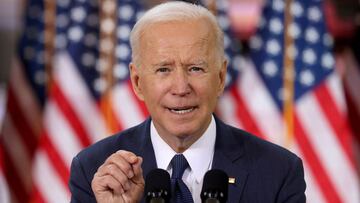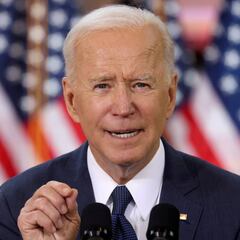Biden’s first address to Congress after 100 days in office
After 100 days in office following his election victory over Donald Trump, Joe Biden will address a joint session of Congress for the first time this week.


Typically presidents address Congress, cabinet officials, and the Justices of Supreme Court in January or February each year. However, being his first year in office, US President Joe Biden's first address has been postponed to give the administration time to prepare a legislative agenda, which will be announced in greater detail during the event.
What is the purpose of Biden's address?
Exciting news: I’m giving the official @GOP response to Joe Biden’s first address to Congress! I’m humbled and honored to have this opportunity to share my positive conservative message with the American people. pic.twitter.com/YDrqnGTwoi
— Tim Scott (@votetimscott) April 22, 2021
The six presidents preceding Biden chose to address a joint session of Congress during their first year in office to outline what legislation they hope to bring forward. Biden has already begun to enact his legislative agenda, most notably with the passage of the American Rescue Plan in March. The president’s speech on Wednesday will be an opportunity to continue making his case to Congress, and the public, on how the remaining pieces of his economic agenda fit into his broader vision for the country.
Due to the pandemic, the event is invitation only and will only be attended by about two hundred officials.
Keeping with tradition, a response from the party not in office will follow the President’s remarks. This year, Senator Tim Scott of South Carolina will provide the Republican response.
A pandemic looms
Thank you to healthcare providers and frontline workers across the country for taking extra steps to care for children safely during the #COVID19 pandemic and helping to protect the health of our families and communities. #VaccinesWork #NIIW #ivax2protect pic.twitter.com/WMcJec2H5L
— CDC (@CDCgov) April 26, 2021
With a widespread vaccination campaign in full force, new variants spreading rapidly in many states and the US economy still struggling to regain the strength it had before the pandemic, Biden is expected to describe the steps the government intends to take to end the coronavirus crisis. Some measures that the president may promote include the passage of more stimulus relief or the allocation of federal funds to revamp and modernize state unemployment insurance systems, whose failures delayed the distribution of benefits to millions last Spring. The president’s speech could also include an indication on how the US can support global vaccination distribution to expedite the process of reaching global herd immunity.
Build Back Better Economic Agenda
Representative Alexandria Ocasio-Cortez and Senator Ed Markey reintroduced their Green New Deal resolution, keeping up pressure on Biden to take sweeping action to address climate change https://t.co/D0kzOjy1op
— Bloomberg (@business) April 20, 2021
The American Rescue Plan is the first piece of legislation that forms part of Biden’s Build Back Better economic agenda. Two other proposals, the American Jobs Plan, which was unveiled in late March, and the American Families Plan, complete Biden’s economic agenda to get the US economy moving as the end of the pandemic nears. The details of the American Families Plan have yet to be announced, but his press secretary has stated that the bulk of his speech to Congress “will be him laying out the specifics of the American Families Plan, his commitment to child care, to education, and to delivering on those priorities.”
The American Jobs Plan is a $2.3 trillion proposal that aims to address climate change, rebuild the nation’s crumbling infrastructure, and improve the working conditions of workers involved in the “care economy.”
Last week, President Biden hosted a virtual summit with 40 world leaders focused on climate. During the president’s remarks, he committed the United States to cutting carbon emissions in half by 2030. The American Jobs Plan was designed to put the country on a path to meet this target. Climate leadership is an area where the United States has lost serious credibility over the last few decades. With much flip-flopping across administrations, the American Jobs Act would ensure that US climate policy is less dependent on which party sits in the White House.
Related stories
Republican support for the proposal has been scant, and last week a group of Senators responded to the proposal with a plan that is only a fraction of the size in terms of monetary outlay. Republicans are wary of legislation that includes many Democratic priorities and would like to pass a bill that focuses on investments in physical infrastructure. Republicans, many of whom represent states that would have to make significant economic transitions away from fossil fuels, are hesitant to support policy that would move the country away from using these energy sources.
Security concerns
After the 6 January insurrection at the US Capitol, security is a concern for the event. However, with fewer lawmakers and other VIPs, the event does not have the same level of security concern as most State of the Union addresses. Still, the Secret Service, Capitol Police, and other cooperating law enforcement agencies have said that careful security planning has been carried out to ensure the safety of the invitees.
- Joseph Biden
- USA coronavirus stimulus checks
- Covid-19 economic crisis
- Science
- United States Congress
- Coronavirus Covid-19
- Economic crisis
- United States
- Pandemic
- Coronavirus
- Recession
- North America
- Parliament
- Economic climate
- Virology
- Outbreak
- Infectious diseases
- Microbiology
- Diseases
- America
- Medicine
- Economy
- Politics
- Biology
- Health

